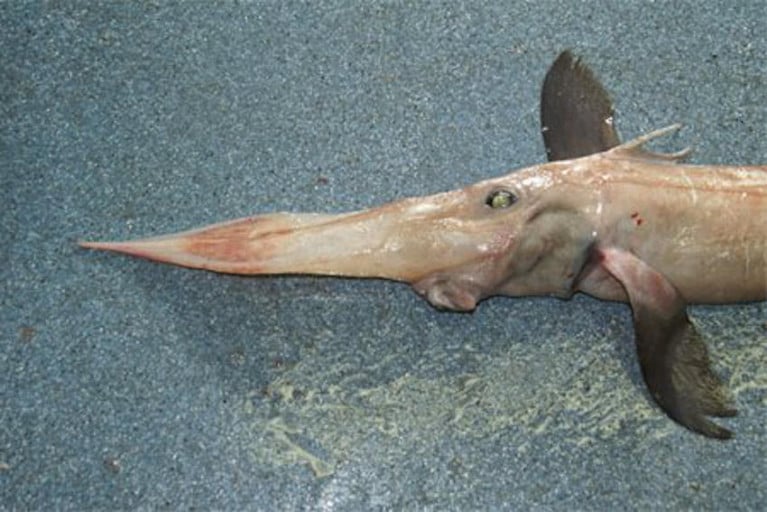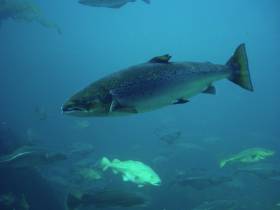Displaying items by tag: ICES
ICES Outstanding Achievement Award for Marine Institute Scientist
Professor Dave Reid of the Marine Institute received an Outstanding Achievement Award from the International Council for the Exploration of the Seas (ICES) at their virtual Annual Science Conference 2021.
Prof Reid is a principal investigator in the Fisheries Ecosystems Advisory Services team at the Marine Institute. As an ecosystem scientist, he is involved in a number of EU-funded projects and leads a team of students and researchers.
The ICES Outstanding Achievement Award honours scientists who have made a notable contribution to the organisation of ICES in the field of marine science over a sustained period of time.
Prof Reid’s first leadership involvement with ICES was chairing the Planning Group on the HAC (file type) Data Exchange Format, a role he held for six years and since then he has participated in 25 working groups, 30 workshops, two strategic initiatives, four steering groups and the Science Committee.
He has also chaired 10 workshops, eight working groups and two steering groups, and is currently an active member of 12 of these groups.
Congratulating Prof Reid, the Marine Institute’s interim chief executive Michael Gillooly said the award recognised his contributions to marine science and his longstanding commitment to ICES.
“It is a great honour for Prof Reid to be acknowledged by his colleagues at the Marine Institute and the international scientific community for his endeavours in science, research, and leadership,” he added.
Prof Reid says he is most proud of his involvement in the ICES Working Group called WKIrish, an ecosystem-based approach to fishery management for the Irish Sea.
“This was a collaboration between ecosystem scientists, with fish stock assessors and fishers in the industry,” he said. “We were trying to explain why the Irish Sea had become less successful as a fishing ground. The fishers had asked for this study, and they really engaged with it. They were with us for the whole journey, and the study had great results.
“The most inspiring aspect of my career by far is the chance to work with young scientists at the start of their career. I’ve always found this incredibly stimulating — they are smart, lively, switched on and sparky people.
“Working with people like that not only keeps me semi-young, but I also get to train them, see them develop and continue on to careers in marine science and some of my ex-graduates are now working at the European Commission and governments around the world.”
Marine Institute’s Chief Executive Elected to ICES Bureau
The Marine Institute’s chief executive has been elected to the Bureau of the International Council for the Exploration of the Seas (ICES) at the recent annual meeting of its member countries.
Dr Paul Connolly — one of two ICES delegates for Ireland along with Dr Ciaran Kelly, also of the Marine Institute — was voted onto the executive committee of the ICES Council, its principal decision- and policy-making body, at the recent annual meeting of member countries on 21-22 October.
Marine Minister Charlie McConalogue was among those offering their congratulations to Dr Connolly on his new appointment.
“Ireland relies on the work of ICES to support the sustainable use of our seas and oceans and Dr Connolly’s election will further enhance Ireland’s contribution to this valued international organisation,” the minister said.
Marine Institute chairman Dr John Killeen added: “On behalf of the board, I congratulate Dr Connolly on his election by the member countries of ICES to this prestigious and important position.
“The Marine Institute has a long-standing relationship with ICES and regard it as an essential forum for our scientists to collaborate with their international colleagues to deliver impartial advice for our decision makers.”
Dr Connolly has served the ICES community since he was first appointed Irish delegate in 2000, when he took up his role as director of fisheries and ecosystems advisory services at the Marine Institute.
Dr Connolly was elected vice president of ICES in 2003 and served on its board until 2005. He then served as MCAP (Management Committee on the Advisory Process) chair from 2005 to 2008.
He was elected president of ICES from 2012 to 2015, and led the development of the ICES Strategic Plan (2014-2018) which was adopted by 20 member countries. Dr Connolly was appointed CEO of the Marine Institute in October 2019.
ICES is an intergovernmental marine science organisation, with a network of 6,000 scientists from over 700 marine institutes in the 20 member countries that border the North Atlantic.
Ireland joined ICES in 1925 and is a strong supporter of the organisation. The Marine Institute provides a broad range of dedicated marine scientists that make a valuable contribution to the work of ICES.
Through strategic partnerships, ICES works in the Atlantic Ocean also extends into the Arctic, the Mediterranean Sea, the Black Sea, and the North Pacific Ocean. Some 2,500 scientists participate in ICES activities annually.
ICES advances and shares scientific understanding of marine ecosystems and the services they provide, and uses this knowledge to generate state-of-the-art advice for meeting conservation, management and sustainability goals.
This year’s ICES Council meeting dealt with a broad range of marine issues including the impact of the Covid-19 pandemic on scientific data collection, analysis and advice delivery; on the finances of the organisation and on how ICES might contribute to the UN Decade of the Ocean (2021 to 2019).
Workshop Aims To Map Deepwater Sharks In North-East Atlantic
Experts in shark biology, data and mapping recently met at the Marine Institute’s headquarters in Oranmore, Co Galway to map the distribution of deepwater sharks, skates and chimaeras in the North-East Atlantic Ocean.
Scientists and marine experts at the International Council Exploration of the Seas’ (ICES) WKSHARKS Workshop analysed decades of data from research surveys in the North Atlantic Ocean.
This included nearly 30 years of data collected by Irish scientists on board the Marine Institute’s RV Celtic Explorer and commercial vessels.
The WKSHARKS Workshop included experts from Ireland, the United Kingdom, Portugal, France and Denmark, with other experts contributing remotely from Norway, Iceland and the Netherlands.
And their aim was to produce maps that indicate the area and depth of 25 species of deepwater sharks, skates and chimaeras — information that will assist in understanding the range and habitat of these marine wildlife species, underpinning future management decisions.
It will also be considered by the Convention for the Protection of the Marine Environment of the North-East Atlantic (OSPAR) and the North-East Atlantic Fisheries Commission (NEAFC) to determine future action to sustainably manage these populations.
These two organisations have a joint interest in the open North Atlantic, while ICES scientists have unique knowledge of the deepwater fisheries and species in this area, which focuses on waters off Ireland, Portugal and Iceland.
Maurice Clarke, fisheries scientist at the Marine Institute and WKSHARKS Workshop chair, said: “Sharks and rays have an important function in maintaining balanced and healthy marine ecosystems. Providing scientific advice is essential to protecting these marine species in the North-East Atlantic.
“For many of these species, this is the first time that data from European surveys is being collated and analysed for this purpose.”
Irish waters are home to 71 species of sharks, skates, rays and chimaeras. These species include some of the latest maturing and slowest reproducing of all vertebrates, resulting in very low population growth rates with little capacity to recover from overfishing and other threats such as pollution or habitat destruction.
ICES received a joint request from the Convention for the Protection of the Marine Environment of the North-East Atlantic (OSPAR) and the North-East Atlantic Fisheries Commission (NEAFC) to develop distribution maps of deep-sea sharks, rays and skates, and also to advise on methods of mitigating bycatch of these species.
To track Atlantic salmon movements from river to sea and back, millions of salmon have been tagged over the past 50 years as part of scientific international tagging programmes.
Recently, ICES published a co-operative research report documenting 50 years of marine tag recoveries from Atlantic salmon, and marking 2019’s declaration as International Year the Salmon.
Programmes have included tagging of smolts, migrating out from their freshwater nurseries to the sea and their recaptures in high-seas fisheries off Norway and the Faroes, in coastal fisheries around Greenland and upon return to home waters.
Other studies included tagging of adults caught at sea and their subsequent recaptures in home waters in coastal fisheries and by anglers.
“Tagging and related data efforts are crucial as scientists seek to improve understanding of wild Atlantic salmon distribution and migration at sea and the underlying causes of mortality,” said Niall O'Maoileidigh of the Marine Institute.
“This is particularly important given that, despite initiatives that have mitigated some declines, abundance of the species has continued to drop in the last two decades.”
Tagging has included various types of external ‘floy tags’ focusing in the past 20 years on coded wire tags, less than 2mm in length and delicately implanted into the nose cartilage of fish.
This report not only documents the history of these tagging programmes for posterity but also investigates migration patterns, timings, return rates, their changes and patterns.
“Mass marking techniques still provide basic information on survival rates, exploitation rates and migration in general. However, with current technology e-tagging is becoming far more informative, giving rise to information not only of the ‘when and where’ of tagging-releases and recaptures, but also on the movements, routes, depths and behaviours in-between,” O’Maoileidigh added.
Earlier this week Ireland’s first salmon of 2019 was caught and released on New Year’s Day in Co Donegal.
Irish Scientist Appointed Vice Chair Of International Council for the Exploration of the Sea’s Advisory Committee
#MarineScience - Dr Colm Lordan of Fisheries Ecosystems Advisory Services at the Marine Institute has been appointed as one of the Vice Chairs of the International Council for the Exploration of the Sea (ICES) Advisory Committee.
The ICES Advisory Committee (ACOM) is responsible for providing scientific advice to competent authorities in support of the sustainable management of marine resources and ecosystems in the North Atlantic Ocean. Dr Lordan will work 50% of the time in his new ACOM role and 50% in his team lead role at the Marine Institute.
Dr Lordan joined the Marine Institute in 1998 and participated in Northern Shelf and Southern Shelf demersal stock assessment working groups.
In 2003, his focus moved to nephrops stocks and developing underwater television surveys and assessment methods. Dr Lordan currently leads a team of marine scientists working on demersal fish and nephrops surveys, stock assessment and scientific advice.
Dr Lordan said he is expecting his three-year term as Vice Chair of the ICES Advisory Committee to be both busy and diverse.
“I am looking forward to getting a broader perspective on the advisory system and I hope to learn a lot about stocks, fisheries, assessments, and management challenges in areas beyond the Celtic Seas,” he said.
“I am also interested in collaborating with others to improve the quality assurance and to develop new and innovative advisory products.”
Dr Lordan was first involved with ICES in 1993, and since then has participated in 60 different ICES expert groups and chaired or co-chaired 16 working groups.
ICES has a network of more than 5,000 scientists from over 690 marine institutes in 20 countries. For more information on ICES visit www.ices.dk.
Marine Institute Library Catalogue goes Online
The Marine Institute's specialist research library, Oceanus with has over 5,000 books relating to marine, natural and life sciences is now open online. The institute's extensive collection of scientific literature relating to marine and freshwater resources is available to browse in advance of visiting the library in person to access the material.
"The foundations of the Marine Institute Library collection began with materials acquired by the Fisheries Branch of the Department of Agriculture and Technical Instruction for Ireland, which was established in 1899," said Dr. Peter Heffernan, Chief Executive of the Marine Institute.
According to Anne Wilkinson, the Institute's Library and Information Manager, "Our unique archive material, dating from c. 1890, is an important element of this collection. The archive includes scientific reports, books and publications prepared by Irish and international marine researchers, including copies of Fishery Ireland Acts dating from the late 1800s and Reports of the Inspectors of Irish Fisheries and Sea and Inland Fisheries Ireland from the same period."
The Library archive has a microfiche reader to facilitate access to some of this material. In addition there are many research reports prepared by Marine Institute scientists and marine related publications issued by the EU, the International Council for the Exploration of the Sea (ICES), and the Food and Agriculture Organisation of the United Nations (FAO).
To go online to the libray click this link hereFor an appointment at the Oceanus Library which is open to the public you can contact the library Tel: (091) 38700 or email: [email protected]. The Marine Institute headquarters is located at Rinville, Oranmore, Co. Galway.

































































